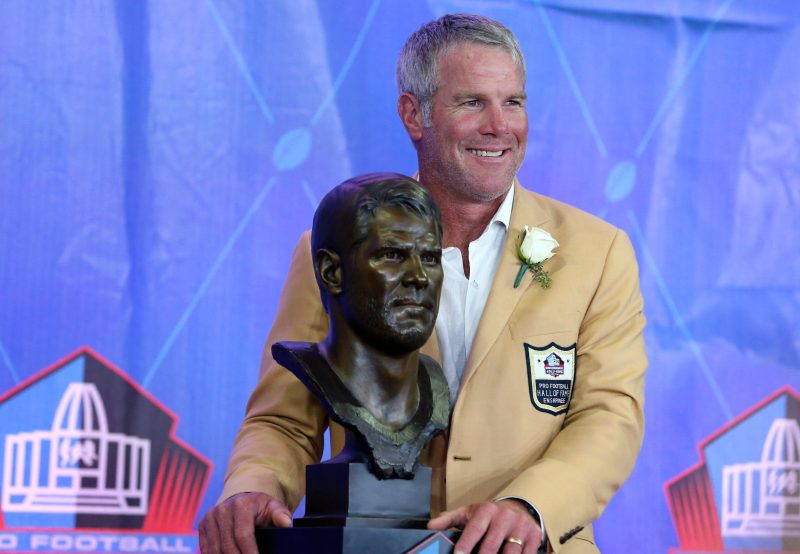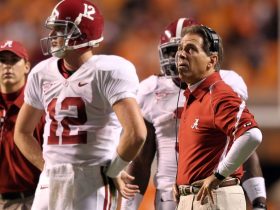(This story has been updated with new information, a new video and to correct a misspelling.)
Pro Football Hall of Famer Brett Favre says he has Parkinson’s disease, he revealed during a congressional hearing in Washington on Tuesday.
Favre testified in front of the House Ways and Means Committee, which is investigating how states are spending money intended for needy citizens.
“Sadly, I also lost an investment in a company that I believed was developing a breakthrough concussion drug I thought would help others,” Favre said. “I’m sure you’ll understand, while it’s too late for me because I’ve recently been diagnosed with Parkinson’s, this is also a cause dear to my heart.”
The World Health Organization says that Parkinson’s disease is a ‘brain condition that causes problems with movement, mental health, sleep, pain and other health issues.’ There is no cure and it is estimated that nearly one million Americans are afflicted with the disease.
NFL STATS CENTRAL: The latest NFL scores, schedules, odds, stats and more.
Favre issued a number of thanks on X later Tuesday.
‘As you know, I was recently diagnosed w/ Parkinson’s which has been an ordeal,’ Favre wrote. ‘My wife, family, and friends have been supportive and I want to thank them for being there for me.
‘To my fans and those wishing well — thank you all for the love.’
Favre, 54, has not been criminally charged, but he is one of more than 40 people who have been sued by the state of Mississippi, demanding repayment of money through the Temporary Assistance for Needy Families. Mississippi is trying to recover more than $90 million, of which more than $5 million went to the University of Southern Mississippi Athletic Foundation to cover the construction costs of a volleyball arena.
Favre’s daughter had started playing on the school’s volleyball team in 2017.
“I wanted to help my alma mater and benefit the community,” Favre said to Congress. “Southern Miss introduced me to the nonprofit to see if they could help with funding. I had no way of knowing that there was anything wrong with how the state funded the project especially since it was publicly approved by many state agencies and multiple attorneys including the Attorney General.”
“A court gag order bars the parties from discussing the specifics of the lawsuit,” Favre added. “Instead, I’m here to share what I’ve now seen up close, about how reforms are needed to stop the misspending of TANF funds.”
Favre has repaid $1.1 million, which he received for speaking fees from a nonprofit organization, but Mississippi Auditor Shad White says he still owes nearly $730,000 in interest.
Favre’s testimony is the latest chapter in a quick and stunning fall from grace for a man who used to be one of the country’s most beloved athletes.
The only player to win the NFL MVP award three years in a row (1995-97), Favre became a crossover celebrity while playing for the Green Bay Packers from 1992 to 2007. His folksy demeanor, sense of humor and devil-may-care approach to the game – not to mention his ubiquitous presence as a commercial spokesman – were largely responsible for reviving the once-great franchise from a long dormant period.
The Pack won Super Bowl 31 to cap the 1996 season, Favre with the starring role (246 yards, 2 touchdowns passing and a rushing TD) in a 35-21 defeat of the New England Patriots in New Orleans – just a stone’s throw from his hometown of Kiln, Mississippi. The Pack returned to the Super Bowl the following season but lost to the Denver Broncos.
A second-round pick out of Southern Miss in 1991 − Favre survived a car crash in college that nearly took his life – he was traded by the Atlanta Falcons to Green Bay following a forgettable rookie campaign. An injury to Packers quarterback Don Majkowski in the third game of the 1992 season forced Favre into the Packers’ lineup, and he never left. His ability to play through injuries and adversity – and play well, notably a 2003 Monday night game in the aftermath of his father’s death – was another of Favre’s aspects that fans gravitated toward. His 321 consecutive starts, including playoffs, remain an NFL record, though speculation will likely only increase as to how his Ironman streak will affect his apparently compromised health moving forward.
Favre’s playing career certainly also had its darker side. He checked into rehabilitation for a Vicodin addiction in 1996, and he admitted to drinking heavily while in Green Bay. He was fined $50,000 by the NFL after allegedly sending a picture of his genitals to a New York Jets employee in 2008, an accusation Favre denied and was never suspended for.
On the field, his 336 career interceptions are 59 more than any other quarterback in NFL history. His final pass with the Packers was picked off in overtime of the 2007 NFC championship game, ultimately costing Green Bay a trip to Super Bowl 42. After one of his many dalliances with retirement, he was traded to the Jets in 2008, leading to the ascendance of Aaron Rodgers with the Packers. In 2009, Favre joined the NFC North-rival Minnesota Vikings, causing many fans in Wisconsin to deem him a vindictive traitor. Favre nearly led the Vikes to Super Bowl 44 in 2009 but more miscues and a battering from the Saints in the NFC title game at New Orleans ultimately undermined Minnesota.
Favre retired for good after being injured during the 2010 season. He left the game as the NFL’s all-time leader in yards (71,838) and touchdowns (508) passing among numerous other records. Many of his marks have since been broken several times over, Tom Brady now holding most of the league’s major passing marks.
Favre was inducted into the Pro Football Hall of Fame in 2016.







